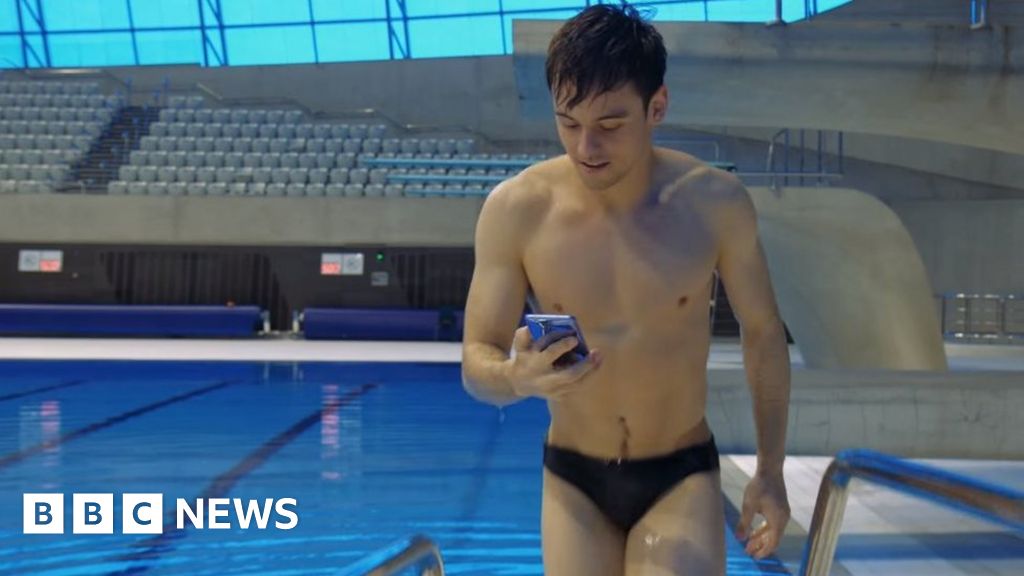HTC's Tom Daley Swimming Pool Selfie Advert Banned

 Image copyright
HTC
Image copyright
HTC
An advert showing British Olympic diver Tom Daley using a smartphone at a swimming pool has been banned on the grounds that similar behaviour by consumers would damage the device.
HTC has promoted the ad on social media since mid-2017.
But an investigation by the UK's advertising watchdog discovered that the device's own instructions said the phone should not come into contact with pool water.
HTC apologised on Thursday.
The Taiwanese firm also removed the promotion from its YouTube channel.
In a statement, it said: "We are disappointed by the ASA ruling, but have removed the video from our sites.
"We apologise if anyone felt misled as to the handset's water resistant capabilities."
The advert was designed to highlight the HTC U11's squeezable sides, which - when pressed - trigger a photo from its front "selfie" camera.
It showed Mr Daley repeatedly jumping from the highest platform at a swimming pool, and taking images of himself as he fell.
In addition, the athlete was shown using the phone as he climbed out of the water.
HTC defended the campaign on the grounds that the device's IP67 waterpoof rating meant it could be briefly submerged up to a depth of 1m (3.3ft).
It said that because Mr Daley had entered the water with his feet and held the phone above his head, the phone had not gone any deeper.
Furthermore, an on-screen warning had told viewers not to "try this stunt".
But the Advertising Standards Authority said that a normal member of the public attempting something similar would be unlikely to be able to prevent their phone sinking below 1m.
The watchdog also noted that HTC had acknowledged that "there were too many variations of water temperature and chemical composition" to be able to say that the U11 could be used in most swimming pools.
And it highlighted that the device's own instructions said it should not be intentionally submerged in water, and were that to happen by accident its buttons should not be pressed immediately afterwards.
As a result it judged the ad to have exaggerated the phone's capabilities in a misleading manner.
Although the original complaint had been about the appearance of the ad on Facebook, the ASA said that other posts must now be dealt with.
"Our ruling against HTC applies across media," a spokesman told the BBC.
"We expect HTC to ensure its ad is removed from all media and we'll be contacting the company to remind them of that."
The BBC understands that the firm intends to remove the ad from all its global accounts by the end of the day.
The ASA also issued other tech-related rulings among its latest decisions, including:
- a ban of an ad for the OnePlus 5 smartphone, which had featured "excessive gore"
- finding that four listings on Amazon's UK website had misrepresented the size of the discounts offered on electronic goods
- agreeing that a TV ad by Barclays Bank had misleadingly implied that if a website featured a green padlock symbol in its browser address bar then it could be trusted
- judging that the charity Electrosensitivity-UK held inadequate evidence to back up claims in a poster that wi-fi and other types of electromagnetic radiation posed health risks
From Chip War To Cloud War: The Next Frontier In Global Tech Competition
The global chip war, characterized by intense competition among nations and corporations for supremacy in semiconductor ... Read more
The High Stakes Of Tech Regulation: Security Risks And Market Dynamics
The influence of tech giants in the global economy continues to grow, raising crucial questions about how to balance sec... Read more
The Tyranny Of Instagram Interiors: Why It's Time To Break Free From Algorithm-Driven Aesthetics
Instagram has become a dominant force in shaping interior design trends, offering a seemingly endless stream of inspirat... Read more
The Data Crunch In AI: Strategies For Sustainability
Exploring solutions to the imminent exhaustion of internet data for AI training.As the artificial intelligence (AI) indu... Read more
Google Abandons Four-Year Effort To Remove Cookies From Chrome Browser
After four years of dedicated effort, Google has decided to abandon its plan to remove third-party cookies from its Chro... Read more
LinkedIn Embraces AI And Gamification To Drive User Engagement And Revenue
In an effort to tackle slowing revenue growth and enhance user engagement, LinkedIn is turning to artificial intelligenc... Read more

